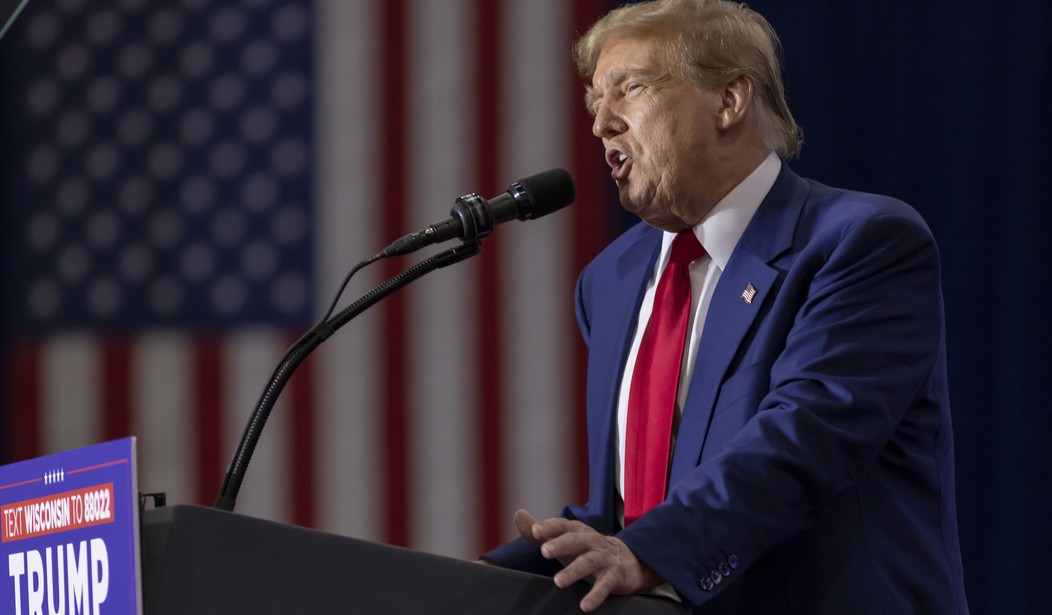The ancient Chinese military theorist Sun Tzu taught that a battle is won before it is fought because it is won by choosing the terrain on which it will be fought. If former President Donald Trump and other Republicans on the ballot this fall want to win, they must choose the proper terrain.
That means focusing on key issues that play to comparative GOP strengths: immigration, crime and inflation/the economy. President Joe Biden's job approval rating on each issue is horrific -- on immigration above all, and rightly so. Furthermore, according to a recent Quinnipiac poll, independents rate immigration and the economy as their top two issues this cycle; those just happen to be Republicans' top two issues, as well. That's a marked contrast from Democrats' top issues, which per Quinnipiac are climate change, gun violence and preserving democracy. The disconnect between Democratic partisans and independent Americans is real, pronounced and ripe for exploitation.
If the goal is to win elections -- a necessary condition for actually wielding political power and implementing one's preferred policies -- then it makes no sense to focus on issues that do not play to one's comparative strength. This is so obvious that it hardly needs to be said.
In U.S. politics, abortion is not currently an issue of comparative strength for pro-lifers and the only major party that pays any lip service to our cause, the GOP. True, numerous Republican governors have won elections in recent years after enacting pro-life legislation. But every time the issue has been directly presented to voters since the Dobbs Supreme Court case of 2022 mercifully overturned Roe's abortion "right," the pro-life side has lost. Most recently, the voters of conservative-leaning Ohio voted for Issue 1, a ballot initiative broadly legalizing abortion.
Recommended
This is painful to concede, as a long-time pro-lifer. And it is made doubly painful by my belief, as this column has previously argued, that a proper interpretation of the 14th Amendment's Equal Protection Clause requires construing "person(s)" in the constitutional text to include all natural persons -- born and unborn. The upshot is that abortion should not merely be banned by legislative majorities -- it should be held unconstitutional. And it would be if we lived in an ideal world.
But we live in the real world.
It is against this backdrop that Trump, the man who called himself "very pro-choice" in a 1999 interview but who subsequently became the darling of the pro-life movement after his three Supreme Court nominees all joined the historic Dobbs majority, released a new video on abortion. Trump rejected pro-life advocacy groups' call for any kind of national legislation, instead taking the stance that abortion ought to be a "states' rights" issue. Echoing Stephen Douglas' "popular sovereignty" rhetoric from his 1858 debates against Abraham Lincoln, Trump stated, "The states will determine by vote or legislation or perhaps both, and whatever they decide must be the law of the land."
So, is Trump's stance correct? In terms of principle -- meaning the substantive debate over whether, to borrow from Lincoln's 1854 Peoria speech, the unborn child is not or is a natural person -- Trump's stance is incorrect. But in terms of discerning empirical realities and exercising political prudence -- another defining Lincolnian virtue -- Trump's stance is defensible and perhaps even reasonable.
It would have been best if Trump had staked out the position of supporting a 15-week (or even 20-week) national ban as a backstop, as some of his presidential primary opponents did. But Republicans will not attain a filibuster-proof, 60-senator majority after November, so such talk is academic. The real impact of Trump's stance is rhetorical abandonment (for now) on the national stage, thus letting the Democratic Party's abortion-rights radicals attempt to fill the legislative void absent meaningful opposition. But that damage is mitigated by the benefit of shifting the campaign trail terrain on the national stage to issues of comparative political strength, as Sun Tzu would advise.
That tradeoff presents a judgment call on which reasonable minds can disagree.
When one tactically retreats, though, it is still imperative to articulate the value of the principle at issue. Trump could learn a lot here from Lincoln. So too, for that matter, could certain prominent Republicans in Arizona, such as former Gov. Doug Ducey and U.S. Senate candidate Kari Lake, who reacted with shock and dismay to a state Supreme Court this week upholding the dignity of unborn human life.
Overall, the pro-life cause must be less concerned with short-term tactical disagreements and more concerned with unanimity as to the long-term goal. If "states' rights" (which Dobbs gave us) become the goal, that is a big problem. The true goal remains unambiguous: constitutional personhood. We have a lot of hearts and minds still to persuade to get there. But we also need political power. Hence, the paradox.
























Join the conversation as a VIP Member